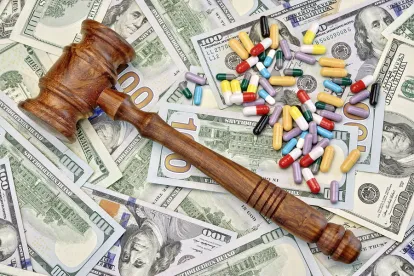On February 6, 2019, the Department of Health and Human Services (HHS) published a Proposed Rule modifying the Anti-Kickback Statute safe harbor protection with the aim of lowering prescription pharmaceutical product prices and out-of-pocket costs for (primarily Medicare Part D [Part D] and Medicaid Managed Care Plan [Medicaid MCO]) consumers.1 With the Proposed Rule, HHS hopes to encourage medication manufacturers to pass discounts directly to consumers and develop a transparent framework for the prescription pharmaceutical product market. Comments on the Proposed Rule submitted to HHS by 5 p.m. EST on April 8, 2019 will be considered.
The Anti-Kickback Statute
The federal Anti-Kickback Statute prohibits offering, paying, soliciting or receiving any “remuneration” in exchange for, or to induce, the referral of a patient for items or services covered by Medicare, Medicaid or another state healthcare program.2 The prohibition applies regardless of whether the remuneration is provided directly or indirectly, overtly or covertly, in cash or in kind. In addition, the Anti-Kickback Statute prohibits the solicitation or receipt of any remuneration in return for the activities described above.
The Anti-Kickback Statute provides that a violation of the statute is a felony punishable by imprisonment and significant fines, or both.3 The Medicare and Medicaid Patient and Program Protection Act of 1987 added the civil remedy of exclusion from participation in Medicare, Medicaid and other state healthcare programs for violations of the Anti-Kickback Statute. A defendant who has been found guilty of an offense described in any federal statute may be subject to a number of criminal and civil penalties.
The statute, according to HHS itself, is “extremely broad.” Not only does it prohibit kickbacks, bribes and other blatantly unethical means of inducing Medicare referrals, but it also covers a variety of financial arrangements that are common commercial practices and often benign in their effect.
Safe Harbors
Since the Anti-Kickback Statute on its face is so broad, concerns arose in the provider community that many relatively innocuous commercial arrangements could be viewed as violating the AntiKickback Statute. Thus, as part of the Medicare and Medicaid Patient and Program Protection Act of 1987, Congress directed the HHS Office of Inspector General (OIG) to promulgate regulations specifying payment practices that would not be treated as criminal offenses under the Anti-Kickback Statute, and would not provide a basis for exclusion from Medicare, Medicaid or other state healthcare programs. The resulting regulations, often referred to as the “Safe Harbor Rules,”4 were intended to give guidance and comfort to providers who engage in certain narrowly prescribed business practices that Congress did not intend to prohibit by the Anti-Kickback Statute and, in some instances, should be encouraged by the federal government. Currently, there are 28 safe harbors, including the Discount Safe Harbor.5 Under the Proposed Rule, the Discount Safe Harbor would be amended6, and two new safe harbors added: (1) Point-of-sale reductions in price for prescription pharmaceutical products (Point of-Sale Reduction Safe Harbor)7 and (2) PBM service fees (PBM Service Fees Safe Harbor).8
Amending the Discount Safe Harbor
In the Proposed Rule, HHS proposes to exclude from the Discount Safe Harbor certain types of remuneration offered by drug manufacturers to Part D plan sponsors and Medicaid MCOs that may pose a risk to certain federal healthcare programs and beneficiaries.9
Specifically, HHS proposes the elimination of Discount Safe Harbor protection price reductions on prescription pharmaceutical products to Part D plans and Medicaid MCOs offered by manufacturers.10 However, the Discount Safe Harbor would continue to protect discounts on prescription pharmaceutical products offered to other entities.11 Notably, the reduced safe harbor protection would expose to full anti-kickback scrutiny any manufacturer rebates on a product to an insurer for its private pay plans if such rebate is conditioned on the product’s favorable formulary placement across all plans (including Part D plans).12 HHS proposes implementing this amendment as effective on January 1, 2020.13
Point-of-Sale Reduction Safe Harbor
HHS proposes creating the Point-of-Sale Reductions Safe Harbor to protect point-of-sale price reductions offered by manufacturers on certain prescription pharmaceutical products that are payable under Part D or by qualifying Medicaid MCOs.14
This proposed safe harbor would protect manufacturers who offer reductions in price on a particular prescription pharmaceutical product to a plan sponsor under Part D, to a Medicaid MCO or to a pharmacy benefit manager (PBM) contracted with either, if (1) the price reduction is set in advance, (2) the price reduction does not involve a rebate unless the full value of the reduction in price is provided to the dispensing pharmacy through one or more chargebacks, or the rebate is required by law, and (3) the price reduction is completely reflected in the price the pharmacy charges the beneficiary at the point-of-sale.15
“Set in advance” is proposed to mean that the terms of the price reduction would be fixed and disclosed in writing to the plan sponsor under Part D or the Medicaid MCO by the time of the initial purchase of the product at the reduced price.16
“Chargeback” is proposed to mean a payment made directly or indirectly by a manufacturer to a dispensing pharmacy such that the total payment to the pharmacy for the prescription pharmaceutical product is at least equal to the price agreed in writing between the plan sponsor under Part D, Medicaid MCO or contracted PBM, and the manufacturer.17
HHS acknowledged that PBMs may be concerned that processing price reductions at the point-of-sale may provide pharmacies sufficient data to reverse engineer the manufacturer’s or the PBM’s discount structure, and solicited comments on its impact on other stakeholders.18
HHS is proposing an effective date of 60 days after its final rulemaking for the Point-of-Sale Reductions Safe Harbor.19
PBM Service Fees Safe Harbor
Lastly, the proposed PBM Service Fees Safe Harbor would protect payments that a pharmaceutical manufacturer makes to a PBM for certain services the PBM provides to the pharmaceutical manufacturer, for the manufacturer’s benefit, when those services relate to the PBM’s arrangements to provide pharmacy benefit management services to the health plans. Such payments would be protected if (1) the parties have a written arrangement that covers all services provided by the PBM and specifies the compensation for such services, (2) compensation paid to the PBM is consistent with fair market value in an arm’s-length transaction, is a fixed payment (not based on a percentage of sales) and is not determined in a manner that takes into account the volume or value of any referrals or business otherwise generated, and (3) the PBM complies with HHS’ transparency requirements.20
Because it expects services to evolve over time, HHS was not inclined to establish a definition for “pharmacy benefit management services,” but provided a number of examples such as contracting with a network of pharmacies; establishing payment levels for network pharmacies; negotiating rebate arrangements; developing and managing formularies, preferred drug lists, and prior authorization programs; performing drug utilization review; and operating disease management programs.21
HHS interwove transparency obligations into the proposed PBM Service Fee Safe Harbor.22 Each PBM must disclose in writing to each health plan with which it contracts at least annually, and to the Secretary of HHS upon request, the services it rendered to each pharmaceutical manufacturer that are related to the PBM’s arrangements with the health plan and the associated costs of such services.23
New Defined Terms
The Proposed Rule proposes definitions for a number of terms, including “plan sponsor under Medicare Part D,” “manufacturer,” “wholesaler,” “distributor,” “pharmacy benefit manager” or “PBM,” “prescription pharmaceutical product,” “rebate,” “Medicaid managed care organization” or “Medicaid MCO” and “chargeback.”24 HHS is soliciting comments on the sufficiency of the proposed definitions to describe accurately these terms for use in the Proposed Rule.25
Rationale for Changing the Rebate Framework From a policy perspective, HHS wants to improve alignment of protected discount arrangements with evolving understandings of beneficial industry practices.26 The Proposed Rule seeks to curtail the use of rebates so that manufacturers have an incentive to lower list prices and PBMs would have more incentive to negotiate greater discounts from manufacturers.27 By eliminating rebates from manufacturers to PBMs, HHS hopes to encourage discounts provided directly to beneficiaries at the point-of-sale.28 Consequently, HHS expects consumers to experience lower out of-pocket costs and reduced government drug spending in federal healthcare programs.29
HHS expressed concern that prescription rebate practices built around the Discount Safe Harbor may have contributed to the widening gap between negotiated price and list price.30 HHS places considerable weight on the possible causal connection between manufacturers paying rebates to PBMs and list prices rising faster than inflation, and the current trend of PBMs favoring higher-cost drugs with higher rebates over drugs with lower costs, and discouraging the adoption of lower-cost brand drugs and biosimilars.31 That is, that rebates are a cause of price increases for consumers. Consumers experience higher costs, as their out-of pocket costs during the deductible, coinsurance and coverage gap phases of benefits are based on the list price.32 Government payers also experience higher costs for their portion of the premium, cost sharing and reinsurance payments associated with the use of highly rebated drugs instead of less costly alternatives.33
Outcome/Impact
Given the broad impact on discount and discount-like arrangements within the prescription pharmaceutical product supply chain and pricing industry, the Proposed Rule should be top of mind of industry stakeholders.
The Proposed Rule, if finalized, would affect the operations of entities that are involved in the distribution and reimbursement of prescription pharmaceutical products to Part D prescription drug benefit enrollees and Medicaid beneficiaries. In addition to private entities, the Proposed Rule would affect the operation of all state Medicaid agencies, including US territories. Manufacturers and health plans will need to evaluate the terms of current discount arrangements to ensure compliance of government and private pay plans with the revised anti-kickback safe harbors; and PBMs will need to develop compliance and transparency protocols to align the proposed safe harbors.
HHS is soliciting varied stakeholder feedback and comments on many aspects of its Proposed Rule. Comments must be submitted to HHS by 5 p.m. EST on by April 8, 2019.
1 84 Fed. Reg. 2340 (Feb. 6, 2019).
2 42 U.S.C. § 1320a-7b(b).
3 42 U.S.C. § 1320a-7(b).
4 42 C.F.R. § 1001.952.
5 The “Discount Safe Harbor” is codified at 42 C.F.R. § 1001.952(h).
6 84 Fed. Reg. 2363 (Feb. 6, 2019) (to be codified at 42 C.F.R. § 1001.952(h)(5)-(10)).
7 84 Fed. Reg. 2363 (Feb. 6, 2019) (to be codified at 42 C.F.R. § 1001.952(cc)).
8 84 Fed. Reg. 2363 (Feb. 6, 2019) (to be codified at 42 C.F.R. § 1001.952(dd)).
9 84 Fed. Reg. 2363 (Feb. 6, 2019).
10 Id.
11 84 Fed. Reg. 2347 (Feb. 6, 2019).
12 Id.
13 84 Fed. Reg. 2348 (Feb. 6, 2019).
14 84 Fed. Reg. 2363 (Feb. 6, 2019).
15 Id.
16 84 Fed. Reg. 2349 (Feb. 6, 2019).
17 Id.
18 Id.
19 84 Fed. Reg. 2348 (Feb. 6, 2019).
20 84 Fed. Reg. 2363 (Feb. 6, 2019).
21 84 Fed. Reg. 2350 (Feb. 6, 2019).
22 84 Fed. Reg. 2363 (Feb. 6, 2019).
23 Id.
24 84 Fed. Reg. 2347-2349 (Feb. 6, 2019).
25 84 Fed. Reg. 2348 (Feb. 6, 2019).
26 84 Fed. Reg. 2344 (Feb. 6, 2019).
27 84 Fed. Reg. 2352 (Feb. 6, 2019).
28 84 Fed. Reg. 2353 (Feb. 6, 2019).
29 84 Fed. Reg. 2352 (Feb. 6, 2019).
30 84 Fed. Reg. 2340-2344 (Feb. 6, 2019).
31 84 Fed. Reg. 2351-2352 (Feb. 6, 2019).
32 Id.
33 Id.





 />i
/>i
